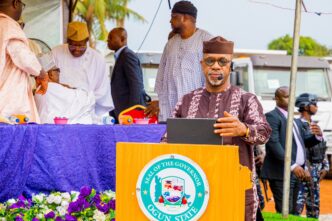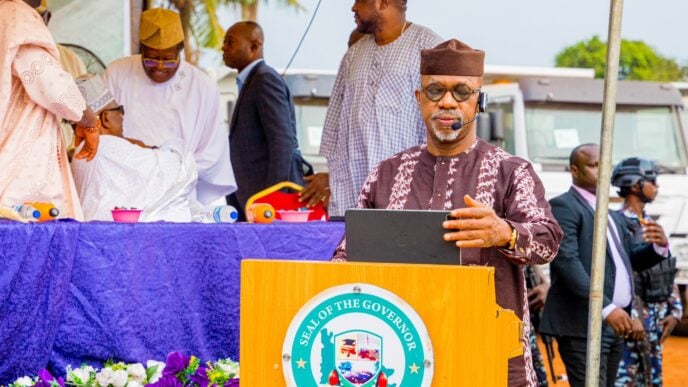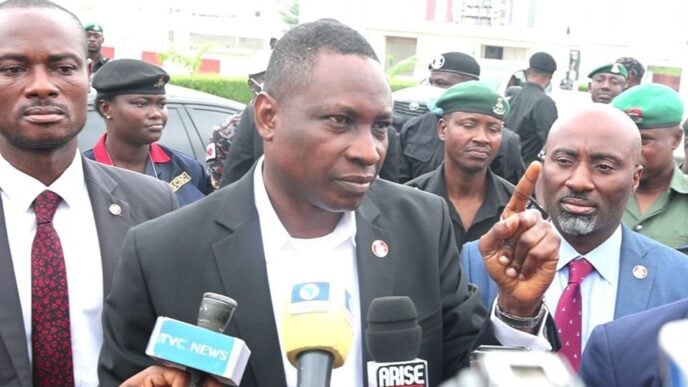BY FOLORUNSO FATAI ADISA
There is an African proverb that says: “Until the lions have their own historians, tales of the hunt will always glorify the hunter.” But what happens when the lions are gone? Who speaks for them? For those of us who did not live through General Ibrahim Badamasi Babangida’s rule as full-grown adults, history is what we inherit from those who tell it. And now, with A Journey in Service, Babangida hands us his version, one where he is the hero, and the villains are conveniently absent.
In his autobiography, “The Maradona” deftly dribbles through the narrative, presenting himself as the protagonist, but the memoir is riddled with contradictions, historical revisions, and self-exoneration. While the book gives us an insight into his leadership style, it fails to reconcile these revisions with the realities of history.
In the following, I will explore some of these inconsistencies.
Advertisement
One of the most glaring contradictions in the book is Babangida’s account of the June 12, 1993, election annulment. He claims that the decision was not his alone but was forced upon him by elements within the military, particularly the late General Sani Abacha. However, this version conflicts with previous interviews where he took full responsibility for the annulment, citing concerns about national security and political instability.
His claim of being outmanoeuvred by political forces rings hollow when we consider the lives lost, the democracy derailed, and the chaos that followed. If Babangida was truly eager to hand over power, why did his every action, from manipulating party structures to installing an interim government, suggest otherwise?
Similarly, his defence of the Structural Adjustment Programme (SAP) is another example of selective memory. Babangida argues that SAP was a necessary reform that encouraged local industry and stabilised Nigeria’s economy. However, in previous statements, he admitted that SAP led to inflation, widespread job losses, and economic hardship. His insistence that SAP was self-initiated rather than imposed by the IMF contradicts available records showing that Nigeria was pressured into adopting IMF-backed policies. The devastating impact of SAP, rising unemployment, currency devaluation, and worsening poverty, remain one of the most contentious aspects of his legacy.
Advertisement
Another significant area where Babangida’s account lacks authenticity is in his discussion of the 1966 coup. In an attempt to dismiss the widely accepted belief that the coup was Igbo-led, he claims it was purely an act of a few young officers without ethnic motivation. However, he concedes that his perspective might be speculative. And speculation, by definition, is not history. If there is no concrete evidence to challenge the well-documented accounts of the coup’s ethnic dimension, why does he attempt to rewrite it? Is this a genuine reexamination of history, or a strategic revision to suit a new narrative?
Also, throughout the book, Babangida carefully creates the image of a leader burdened by difficult decisions, rather than one actively shaping Nigeria’s political and economic trajectory. He downplays the authoritarian aspects of his rule, including press suppression, political assassinations, and corruption scandals, while presenting himself as a misunderstood reformist. General IBB’s attempt to reframe history, particularly regarding June 12, SAP, and the 1966 coup, reads less like a candid memoir and more like a strategic attempt at historical revisionism.
However, dismissing the book entirely would be unfair. I have always believed that every autobiography or biography contains at least one valuable lesson, no matter how flawed. In ‘A Journey in Service’, Babangida gives a compelling discussion of the dangers of fake news and misinformation, particularly how they can destabilise society. One striking example is the 1989 SAP Riots, which he discusses on pages 216–218. He explains how these riots were powered by false propaganda, specifically a fabricated claim in Ebony Magazine alleging that military leaders had stashed millions of dollars in foreign accounts.
The misinformation spread rapidly, convincing political activists, including Dr. Tai Solarin, to support the protests. The result: Two weeks of violent demonstrations and national unrest, all triggered by a claim that, as Babangida asserts, had never actually appeared in Ebony Magazine or any other publication at that time. This incident is a timely reminder for Nigerians today of how false narratives can provoke unrest and mislead even well-meaning individuals. Not even in our present-day world of instant information and social media outrage is critical thinking and fact-checking more important than ever.
Advertisement
Of course, the lingering question remains: Why did Babangida wait over three decades to tell his story? He finally speaks, but many of those who could have countered his claims, MKO Abiola, General Sani Abacha, Arthur Nzeribe, Clement Akpamgbo, Justice Bassey Ikpeme, Justice Dahiru Saleh, Abimbola Davis (ABN Director of Operations), Prof. Omo Omoruyi, Prof. Humphrey Nwosu, and Vice Admiral Aikhomu (whose press secretary announced the annulment, purportedly without Babangida’s approval), are no longer alive to challenge his narrative. Is it any wonder, then, that history in this book appears one-sided?
In conclusion, the ancient Greek historian Polybius once said: “The purpose of history is not the same as that of tragedy, but rather its opposite. Tragedy must startle and entertain its listeners in the present moment by using the most persuasive words, even if they are false. History, on the other hand, must teach and persuade for all time, using only the truth. In tragedy, the ruling principle is deception; in history, it is truth.”
Babangida’s memoir may pretend to be history, but in many ways, it reads more like tragedy, where the protagonist tells his own version of events, and those who could challenge him are long buried. History is not just the past; it is a map of the past, meant to guide the present. The real question now is: Will we let the hunters write the final story, or will we demand the truth before it is too late?
Folorunso Fatai Adisa, a media and communication specialist, writes from the United Kingdom and can be reached at [email protected].
Advertisement
Views expressed by contributors are strictly personal and not of TheCable.
Add a comment










